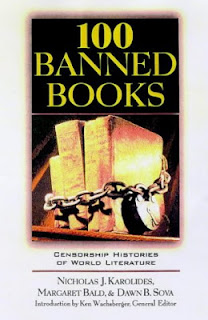 If you are a wholehearted proponent of the First Amendment to the Constitution of the United States, this is a book you will find it absolutely essential to own.
If you are a wholehearted proponent of the First Amendment to the Constitution of the United States, this is a book you will find it absolutely essential to own.
Nicholas Karolides, Margaret Bald and Dawn Sova have compiled censorship histories of 100 books that have been suppressed on political, religious, sexual or social grounds, and they are truly eye-opening. Many of these books have been censored within our own country, where freedom of speech is supposedly protected by the First Amendment.
Under the category of religious censorship, not only have documents challenging the major world religions' accepted beliefs come under fire, but these religions' essential works -- the Bible, the Koran and the Talmud -- have also been suppressed at some point in history.
Works suppressed on sexual grounds run the gamut from mild language or situations to depictions of explicitly violent and humiliating sexual acts. While I find the latter absolutely abhorrent and choose not to expose myself to this type of content, 100 Banned Books is a valuable reminder that, regardless of your personal opinion of what is not appropriate, it is all to easy to cross over the line and try to deny others access to these materials.
Read this book to familiarize yourself with past instances of censorship, and then look in present-day society for examples of ongoing censorship attempts. The results will truly be eye-opening.
Posted Dec. 16, 2000 to amazon.com
